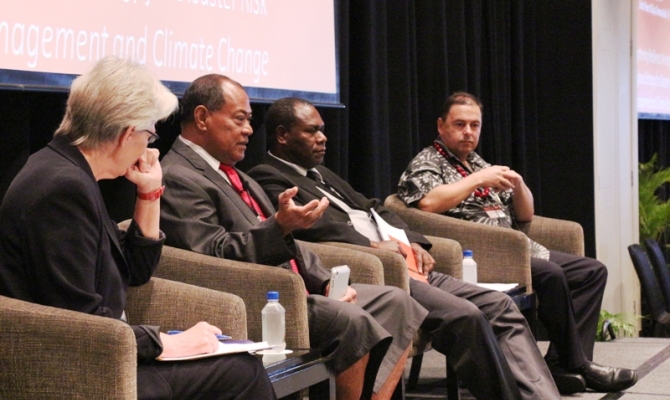
Climate Change Resilience
9 July, 2013, Nadi, Fiji - Cook Islands, Tonga and Vanuatu shared their experiences with integration of climate change (CC) and disaster risk management (DRM) practices at the High Level Dialogue session in Nadi today.
The dialogue provided an opportunity for key decision makers from Pacific Island Countries and Territories to discuss benefits and challenges of adopting a joint CC and DRM approach in their respective countries.
Moderated by the head of the UN Office for Disaster Risk, Margareta Wahlstrom, discussions focused on successful practical implementation of policies at the national level.


Tonga's deputy Prime Minister, Samiu Vaipulu said his government has committed TOP$6 million for emergency purposes in times of natural disaster.
This is a contingency fund that is used to immediately deal with any case of natural disaster.
"However, government is not Santa Claus. We are encouraging our communities to prepare themselves and their families first before government help comes in.
"In Tonga, we are encouraging government and community partnership. This is crucial in dealing with climate change and disaster risk reduction, said Vaipulu.
The Tongan Government has turned to private sector partnership to enhance its means of communicating disaster warnings to the community.
"Some of our key contact points in villages run out of credit on their mobile phones and have difficulties contacting us during disasters. What we have done is worked out a deal with Digicel in Tonga where in the event of an emergency, their numbers are activated for the purposes of reporting the disaster, said Minister Vaipulu.
In Vanuatu, the government has mainstreamed climate change and disaster reduction into its national policy.
Minister Thomas Laken, who is responsible for Environment, Climate Change Adaptation and Disaster Management, told the High Level Dialogue, the Pacific nation is piloting the integrated approach on the island of Epi in the Shefa Province.
"On the island, people will need to relocate inland as a result of the impact of climate change and in the event of a natural disaster. The airport on the island is built on the coast and will need to be relocated inland also because sea water inundation.
Minister Laken said Vanuatu will need assistance of donors to support national efforts in reducing disaster risks and the impact of climate change.
He agreed with the deputy Prime Minister of Tonga that while development partners are an important stakeholder in the integrated approach, 'They must supplement national efforts and not tell us what we need to do. We must decide what we want to do,' said Minister Laken.
Cook Islands Finance Minister Mark Brown shared best practices now implemented by his government to strengthening its public financing system to increase ensure climate financing flows through.
"This is part of our approach to build donor confidence in our financing and budgetary processes. We did this because we found that we were not accessing climate finances.
To deal with the issue at the regional level, the just concluded ADB finance ministers meeting in Tonga, agreed to set up taskforce to look at ways of improving our financial systems because of the stringent requirements of accessing climate financing.
"We have difficulties accessing these funds because of the different requirements at the bilateral, regional and multilateral level. These funds are not getting into the country for project activities.
"This is where we will need the support of regional organisations, who can use their networks and relationships with development partners to access these funding mechanisms, said Minister Brown.
The role of political leadership in supporting the development of the new regional integrated strategy and its implementation at the regional, national and community level is critical to its success.
The High Level Dialogue is intended to provide decision makers with an insight into how they can lead and support national integration of CC and DRM.